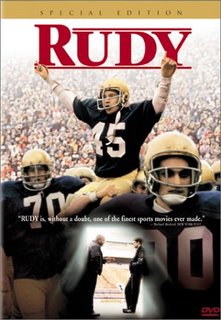The day I met Rudy


"You're 5-foot nothin', 100 and nothin', and you have nearly a speck of athletic ability. And you hung in there with the best college football team in the land for two years. And you're getting a degree from the University of Notre Dame. In this life, you don't have to prove nothin' to nobody but yourself." – Teammate to Rudy in the movie.
I’ve heard the name “Rudy” evoked more than once this past week, which I guess is only natural since Notre Dame is playing Georgia Tech in the big college football game tonight.
Ah, Rudy. I met the real “Rudy” 10 years ago when he gave a motivational speech to students at Mount de Sales in Macon.
He looked like the guy who might show up at your doorstep to deliver a pizza on Friday night. Or the fellow who always wins the beer frame down at the local bowling alley.
Football hero? No way. Subject of a movie? Nah.
Of course, Dan "Rudy" Ruettiger had heard it all before. He built his career on being told he wasn't big enough, good enough or smart enough.
Then he became the most famous one-play player in college football history. The world now knows him as Rudy.
"The appeal of `Rudy' is there is an underdog in all of us,'' Ruettiger told me. "It's the little guy struggling against the big guy. Most everyone can identify with that struggle. There are only one or two stars on every team. Basically, the rest of us are all Rudys, struggling to overcome the perception some people have of us.''
Hollywood has its own formula for sports movies. There's a neat little package that's part fantasy, part fluff. The underdog lives. Good prevails over evil. The hero always makes the last-second shot, throws the winning touchdown pass or clears the fence in the bottom of the ninth.
One play in one game does not necessarily make a hero. Or does it?
Ruettiger spent almost 10 years trying to convince movie producers to tell his story. His perseverance was almost as inspiring as his script.
The soul of his life story is deep in all of us. A little boy wants to grow up to be President. A waitress wants a chance to be an actress.
Rudy wanted to play football for Notre Dame, and he wouldn't take no for an answer.
"A dreamer will tell you to stick to it and do whatever it takes,'' Ruettiger said. "A non-dreamer will tell you it's not worth it.’’
One of 14 children from a Midwestern family, he served in the Navy after graduating from high school in Joliette, Ill., and later went to work at a local power plant. After his best friend was killed in an accident at the power plant, he began his longshot dream of playing for the football factory Irish at the belated age of 23.
He was not particularly smart (he ranked third from the bottom of his class with a 1.77 GPA) nor athletically gifted (he was 5-foot-6, 185 pounds). His strength was that he would not give up.
He was admitted to Holy Cross Junior College in South Bend, Ind., across town from Notre Dame. He was rejected for admission three times before being accepted. By the time he was admitted, his odds of landing on the roster of the football team were even longer.
He worked as a grounds keeper at Rockne Stadium, walked on the football team as a fifth-string defensive lineman and spent most of his career wearing oversized shoulder pads and holding blocking dummies.
His teammates were inspired by his determination, his coaches encouraged by his persistence. He finally got his chance to play as a senior on Nov. 8, 1975 against Georgia Tech in South Bend.
The score was meaningless at the time the Irish led 24-3 with 27 seconds left. Coach Dan Devine sent him in the game on the kickoff team, and he lined up on defense for the final play of the game.
"The Georgia Tech offensive linemen laughed at me,'' Ruettiger recalled.
The last laugh was saved for Rudy. He rushed past to sack Tech quarterback Rudy Allen and 60,000 fans went wild. As his teammates mobbed him, a reserve quarterback named Joe Montana was among them.
Since that day in 1975, no other Notre Dame player has been carried off the field on his teammates' shoulders.
The impact of Rudy has been far-reaching. The inspiration of a cult hero has both saved lives and turned them around.
"I believe the problem with sports today is that not enough of these kinds of stories are emphasized.'' Ruettiger said that day.
Rudy’s message still lives on. Don't be quick to judge others or let them judge you. Don't take shortcuts. Believe in yourself. Get excited when you look at yourself in the mirror.
"The struggles always are going to be there,'' he said. "You'll find the reality of your dream as you go through those struggles. You can be anything you want to be if you have a strong perception of who you are.''

2 Comments:
Rudy is my favorite movie. I just wish the language in it wasn't so bad. It's a great inspirational story that could be shown at school for character education. My nephews finally gave me my own copy. I wish I'd had a chance to meet him.
Rudy, HA! One play where it didn't matter. Please write about something more interesting.
Post a Comment
<< Home